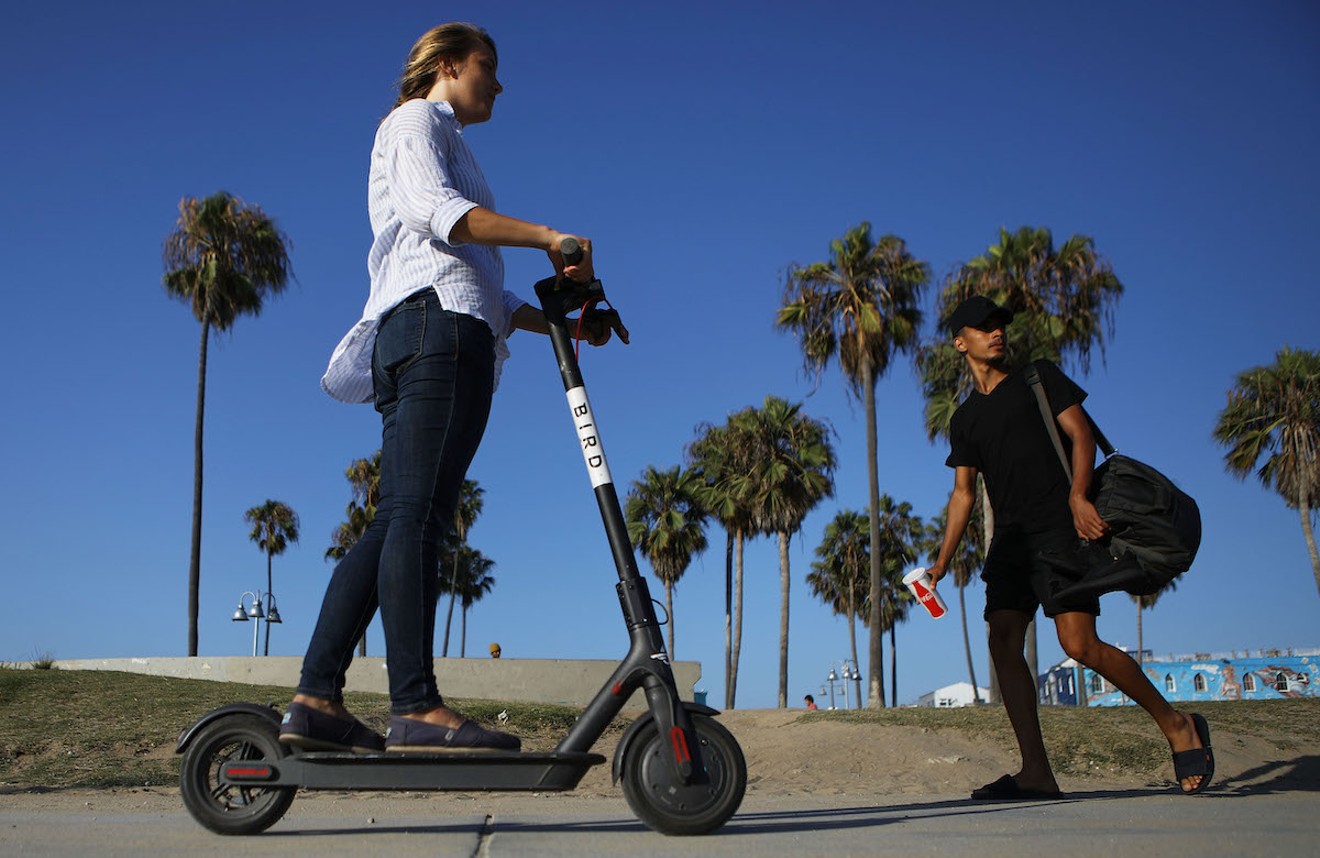Driving or walking around Fort Lauderdale, you'll inevitably encounter electric scooters. Last fall, the dock-less vehicles began popping up all over downtown. On every street corner, a Lime, Bird, or Bolt scooter usually awaits its next rider.
In his most recent newsletter, Fort Lauderdale Mayor Dean Trantalis said that there have been 1 million rides logged in the city and that the scooters have helped reduce traffic congestion throughout downtown.
Yet while some residents enjoy the convenient alternative to get around downtown, many have voiced their displeasure with the e-scooters on the social media site Nextdoor. They claim the scooters are sloppily laid on sidewalks all over the city. Riders threaten the safety of pedestrians and themselves by riding around the city without helmets.
According to Fort Lauderdale Fire Rescue records from December 2018 to May 2019 reviewed by the Sun Sentinel, there have been 74 scooter-related accidents. Twenty-seven-year-old Matias Huff died after he was hit by a car while riding an e-scooter.
Last December 18, David Blattner, a 55-year-old real-estate attorney at Becker & Poliakoff, was heading downtown on a Bird scooter. As he was crossing NE Fourth Street, a truck turning from Federal Highway struck him, leaving him with serious injuries that would require surgery. As a result of his experience, Blattner has become a fierce advocate for scooter regulation. "I am realistic — I don't think [e-scooters] can or should be banned entirely, but they do need to be regulated," Blattner tells New Times. "Speed locations and areas where scooters can and cannot be ridden should be considered by the city."
The state Legislature recently granted cities such as Fort Lauderdale the authority to regulate electric scooters. The city commission is planning on passing new scooter rules to address residents' concerns.
First, Mayor Trantalis says the commission plans to prohibit scooters from sidewalks along the beach and Las Olas Boulevard. They would have to use bike lanes.
"Those are excellent ideas," Blattner says. "There's too much vehicular and pedestrian traffic. The scooters would be too be dangerous with the mix of cars and pedestrians in both [of those areas]."
The city might also prohibit scooters from being parked on sidewalks less than five feet wide to avoid taking up the public rights of away. In addition, the city hopes to create zones with designted speed limits.
The "high-impact event ordinance" that prohibits scooters from being ridden on the sidewalks along the beach will also be updated. During high-impact events such as this past Tortuga Music Festival, spring break, and Memorial Day weekend, scooters were banned on the barrier island. In June, the city deemed summer break a high-impact event and restricted scooters on the beach until August 18.
"We cannot allow scooters to interfere with the quality of life many enjoy through the pedestrian experience on our beach and in our shopping districts," Trantalis said.
In addition, the commission is considering charging more for permits and revoking those of companies that do not meet usage and parking requirements.
"Scooters may be part of the fabric of the community now, but as the leaders of the community, we are committed to ensuring our city streets and sidewalks are safe for all who use them," Trantalis says. "I look forward to approving the regulations as soon as possible."
[
{
"name": "GPT - Billboard - Slot Inline - Content - Labeled - No Desktop",
"component": "16971022",
"insertPoint": "2",
"requiredCountToDisplay": "2"
},{
"name": "Editor Picks",
"component": "15769925",
"insertPoint": "4",
"requiredCountToDisplay": "1"
},{
"name": "Inline Links",
"component": "16575154",
"insertPoint": "8th",
"startingPoint": 8,
"requiredCountToDisplay": "7",
"maxInsertions": 25
},{
"name": "GPT - Rectangle 2x - Slot Auto-select - Labeled",
"component": "15782206",
"insertPoint": "8th",
"startingPoint": 8,
"requiredCountToDisplay": "7",
"maxInsertions": 25
},{
"name": "Inline Links",
"component": "16575154",
"insertPoint": "8th",
"startingPoint": 12,
"requiredCountToDisplay": "11",
"maxInsertions": 25
},{
"name": "GPT - Leaderboard to Tower - Slot Auto-select - Labeled",
"component": "15782207",
"insertPoint": "8th",
"startingPoint": 12,
"requiredCountToDisplay": "11",
"maxInsertions": 25
}
]











